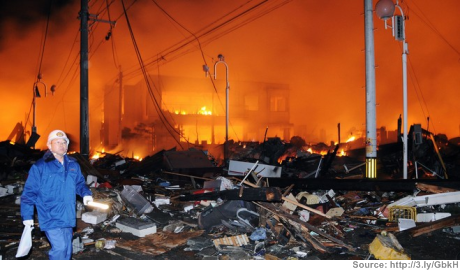How Japan can mitigate cell congestion amid state emergency

An earthquake, a tsunami and now a nuclear emergency. Japan is struggling to cope with the vast damage and loss of life, with over 1,300 people confirmed dead in just over 24 hours after the event first unfolded.
But the cell networks running one of the most technologically advanced nations on the planet is hampering the efforts to aid those in need are struggling to cope, with the vast levels of communications needed to assist the country's recovery becoming congested.
Speaking on the BBC News channel, one Japanese university lecturer currently in England said that many have had to rely on emails and social networking because the cell networks are down. Also many of the universities are cut off and unable to communicate off-campus.
This shows once again a critical vulnerability in the cell network structure. Known as the '9/11 effect', it was named after the first major incident, whereby the cell networks were pushed to breaking point as a result of the mass flooding of communications during the September 11th terrorist attack.

Similarly during other major disasters including localised events, the cell networks struggle to cope with the huge increase in bandwidth from the London bombings to New Year's celebrations; it once again highlights the flaws in network communication.
Voice communication churns up greater bandwidth than text or short bursts of data, such as multimedia messaging and the sending of email. With so many people calling and trying to get through to loved ones, many cannot connect or suffer dropped calls as the congestion becomes too much for the critical infrastructure to handle.
Plus, just as the events on September 11th, the destruction of the Twin Towers also had an effect on the cell networks, as the highest buildings in New York at the time were used for housing cell network masts. Combined with this, congestion on the networks become more concentrated and causes further problems for those trying to call others.
For now, though it would only work on a mass scale, the networks need to recover. It is not as simple as adding a few more servers to the back-end infrastructure, nor is it as easy as rolling out temporary masts. Frankly, the importance for mobile network coverage may not be seen as important compared to a country on the brink of nuclear emergency.
Instead, the people of Japan need to work together and limit the collective use of bandwidth on the networks.
Do not call, but instead send text messages, use instant messengers, social networks and send emails instead. Also, remember landlines may still work and will ease the congestion on the cell network.
While smartphones may not have signal as of yet, when it becomes available the messages will flow for at least a short time. A ping-like burst of push email is less disruptive than a constant flow of data trying to connect two or more people. The ports are being filled too often and too quickly, rather than having a queue of messages that can be fired off one by one.
Also, the use of social networking, a geographically outsourced infrastructure already in place on another continent, can also be used to reduce cell network congestion, by balancing the bandwidth across a vast series of different types of communication.
Related content: